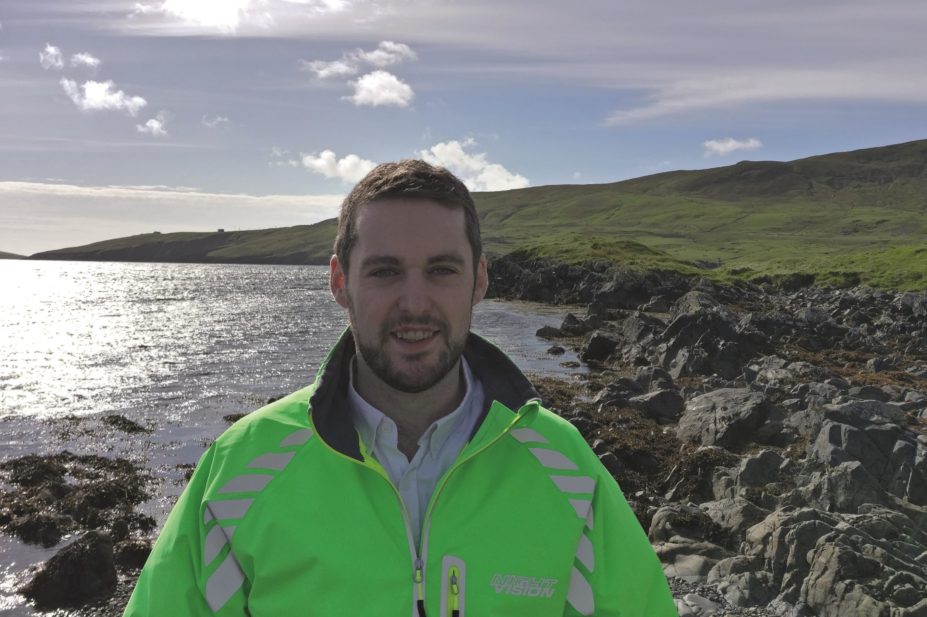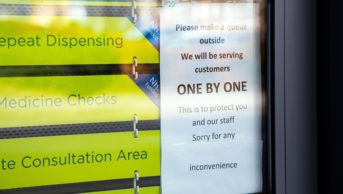
Courtesy of Anthony McDavitt
Anthony McDavitt is a primary care pharmacist and independent prescriber in the Shetland Islands.
What is your career background?
Since joining the register in 2012, I have spent all four of my professional years living and working in the Shetland Islands. Shetland is the most northerly part of Britain, situated over 100 miles off the coast of Scotland. For two years I worked in community pharmacy and was responsible for the introduction of a robotic dispensary into Shetland’s largest independent pharmacy. After two years, I joined NHS Shetland as a primary care clinical pharmacist and, since the summer of 2015, I have been practising as an independent prescriber, meaning that I can prescribe medicines within my areas of competency.
How did you end up working at NHS Shetland?
I arrived here through a mix of chance and opportunity. I knew Shetland was a delightful place to live and work because I spent my summers here processing salmon to fund my time as an MPharm student.
In 2014, I applied for a clinical pharmacist in primary care vacancy at NHS Shetland. The previous year, the vision document for pharmacy in Scotland, Prescription for Excellence (PfE), was published. I saw this as the way forward for pharmacy and this post was an opportunity to contribute to the vision in PfE while fulfilling my own career expectations. The post has lived up to my expectations and offers opportunities for professional learning and development.
How does your role differ from other pharmacy roles because of its location?
Anyone arriving from a larger health organisation would see a difference in the broad scope of pharmacy roles. Being part of a small team, my role has to be diverse. Generalism is valued, even among our specialists. We try to ensure that all our pharmacists have access to a rounded training through our remote and rural fellowship, where we link with colleagues in other areas of remote Scotland.
Our primary care pharmacy service is integrated closely with our hospital pharmacy team and we enjoy a mutually supportive, seamless approach to solving problems.
Where my role does not differ is in the general aim to provide an equitable service. However, this is stymied by Shetland’s position on the map and the islands’ own challenging internal geographies. We are required to provide services to a population of around 23,000 individuals with a markedly older demographic, along a string of islands over 1,400km2 and 100 miles long.
In the winter months (October to March), the essential function of pharmacy — medicines supply — becomes volatile because we are reliant on sea and, in some cases, air freight to get medicines. Year round Shetland has earlier order cut-offs and less frequent deliveries — so planning, contingency and managing patients’ expectations are important.
Ferries enable access to health and dispensing doctors constitute a large part of primary care and require significant input from our pharmacy workforce. There are no nursing home services, only residential care services, which are all part of our integrated service.
What does a typical day look like, in terms of your tasks and responsibilities?
Shetland has ten health centres across the island group. Around 20–40% of my time might be on one of the smaller islands of the archipelago and the remaining days are spent in practices on the main island. Depending on home visits, clinics and meetings, I could easily travel 100 miles in a day so it is important to plan my time carefully.
A typical day begins in a health centre, seeing patients with respiratory conditions and other chronic diseases and conducting medication reviews, both face to face and without the patient present. These patient encounters are usually punctuated with administrative work, such as hospital discharges and medicines reconciliation. The afternoon can include visits to the care centres to review new admissions, discuss discharge plans and follow up on previous reviews. Sometimes this work can involve visiting patients in their own homes to assess their ability in managing medicines and providing clinical review where needed.
Up to one day a week is office based: working on prescribing efficiencies and prescribing support; educating other health and social care professionals; analysing data and handling prescribing queries. Project work, committees and meetings and participating in the local clinical networks also make up a considerable volume of the role.
What do you enjoy most about your role?
I enjoy the feeling of community and purpose the role has within the health and social care sector in Shetland. Having a workload that changes daily and is based in different locations, you soon meet and develop relationships with most of the clinical and non-clinical staff across health and social care, from clerical staff to consultants. I have considerable autonomy in what I do and NHS Shetland’s small scale and community feeling fosters a closeness and familiarity with individuals as opposed to with departments, which encourages us to be responsible, accountable and dependable.
As well as assisting patients with their medicines, there is real reward in assisting your colleagues and the service to manage the complexity some patients are burdened with, either through their diagnoses, social circumstances or medicines.
I would encourage others to contact rural pharmacy teams if they are interested in the work we do and wanted to find out more.
What do you find most challenging about your role?
The process of transition from a community pharmacist to a pharmacist clinician role has been challenging. My previous undergraduate knowledge and community pharmacy experience provided some underpinning knowledge but gaps existed.
In particular, on completing my independent prescribing qualification, it became clear that clinical assessment was an essential prologue to safe, quality prescribing or deprescribing in the primary care setting, and this was a set of skills I was lacking expertise in.
Postgraduate education for pharmacists in these roles was being developed by NHS Education Scotland (NES) and I have been grateful for the help and inclusion in its educational programme for pharmacists working in general practice. With NES’s help and local tutors I have worked towards becoming a competent practitioner.
My wider challenge is selecting appropriate work that is locally achievable and useful. This often means making difficult decisions to not focus on some areas, instead focusing on those that deliver the best outcomes for the local need with the available resources, having first established the needs of our patients.
What might other pharmacists find surprising about working in a rural location?
A former colleague found the free roaming sheep surprising and problematic for her work trips to the outer isles, because they are often crossing the road, darting into your path or simply lying on the road. After a few days of being in Shetland, most people become aware of the lack of trees but the beauty of the coastline and beaches compensates easily.

Courtesy of Anthony McDavitt
Roaming sheep can present a problem when travelling to the outer isles of the Shetland Islands.
What surprised me most, and continues to surprise visiting healthcare professionals, is the age demographic of the people living in Shetland and the impressive general health and well-being they enjoy in older age versus their contemporaries from non-rural Scotland.
What are your future career plans?
In the short term, I will be joining my local non-medical prescribing (NMP) colleagues in completing the Advanced Clinical Examination Skills course and beginning post-registration education in the management of common chronic clinical conditions.
I am also looking forward to formal postgraduate education, which I hope will involve some research in using data to drive interventions.
With colleagues in other rural health boards, we will be developing a network for remote and rural pharmacists to take part in peer review, peer learning and sharing experiences. This will be a good opportunity to support and develop colleagues, and overcome the challenges our services in rural geographies encounter.
In general, I would like to demonstrate that pharmacists have the requisite utility and application to help meet the challenges and demands we face in providing primary care health services.


